Ahead of Uruguay’s first match against Fiji in the Rugby World Cup, we sit down with Setanta College student, Dean Lester, who took up a 9-month strength and conditioning internship with the Uruguay National Rugby Union. Working alongside Craig White, a high-performance consultant appointed to Uruguay for the World Cup, we chat to him about his incredible experience in South America but also the path that has led him to this point in his coaching career.
BIO
Name: Dean Lester
Age : 36
Location: Belfast
Occupation: Strength and Conditioning Coach
Coaching philosophy: ‘Good People make good coaches’. Liam Hennesey, Ged McNamara
Dean, you’ve led quite the journey over the past year. Can you bring us back to the start and give some background to your time studying and coaching to this point?.
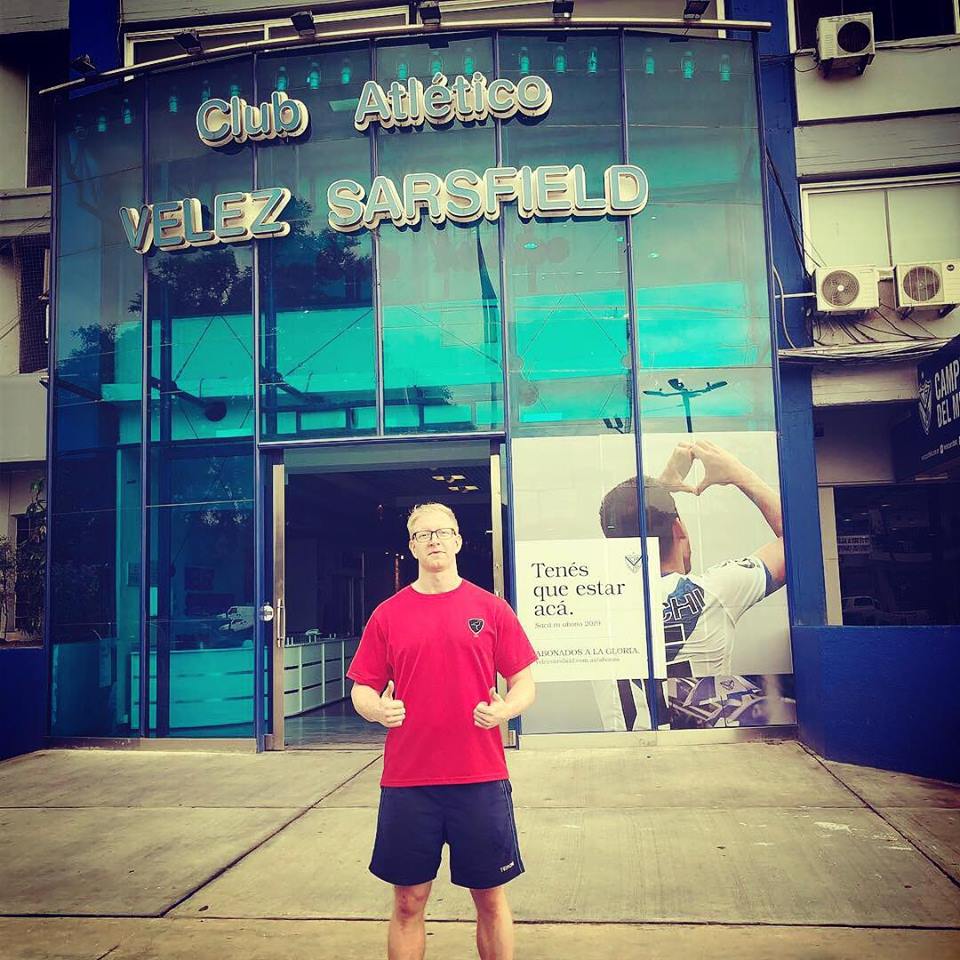
Dean on his first trip away with the senior team outside of Club Atlético Vélez Sarsfield, Buenos Aires.
I started in the fitness industry about 12 years ago. I was young and still playing sport. Long story short, in that time I suffered a lot of injuries including one that shook me a lot. I dislocated my hip and fractured my pelvis. I really wanted to know answers as to why this happened to me. I mean, 3 major dislocations? Both shoulders and a hip. I thought I was doing something wrong. I continued learning, getting a PT qualification and then progressed into working in the corporate sector of fitness. Again this never sat easily with me, it didn’t align with my values and the industry was 100% financially driven. I wanted to help people that had suffered a similar fate to me. In the end, I moved to a little privately owned gym and began my BSc with Setanta and I haven’t looked back since.
From Belfast to Uruguay – a daunting move for a young coach to make. Tell us a little about your time getting prepared and heading to the other side of the world?
It was a very anxious period of time before I got there. For me personally, once I got the backing of my fiancé, parents and in-laws to be, I couldn’t possibly turn it down. Initially, I spent a day in Ulster Rugby with Kev Geary and Chris Hagan. My role was to set up GPS technology for the Uruguayan national team. Something I knew very little about at that stage. Seeing the amount of data and numbers appear in front of me was like looking into the matrix, it would be fair to say it did nothing for my anxiety. I then went down to Leinster Rugby to their HQ at UCD. From the moment I first met Peter (Tierney) to the players coming in, I got this incredible sense of family. A fantastic atmosphere and culture and Peter further simplified the GPS advising me to take things one step at a time, easing my feeling of unrest somewhat. Being in Dublin gave me the feeling of being part of something bigger than rugby and I knew if I can experience that in Uruguay it was going to be a fantastic journey. I did and some more.
Your role was primarily based around preparation for the Rugby World Cup. What was the set-up, training, and overall focus for the squad?
When I first went out immediately I was involved in the Americas Championship. A tournament in which we beat both Canada and USA Rugby to finish second. For me, it was about hitting the ground running, introducing GPS, and simply gathering the data. Some of the players were involved in the MLR and France so Craig and Guille communicated with them while the home-based players trained at the Charrua Stadium. Initially, what Craig did was introduce little details of the program that really made a huge difference. Pre and Rehab work was programmed and brought individualisation to each players program. Communication between staff was a huge thing, building interpersonal relationships between the S&C Dept, Medical Dept, and Technical Staff was something that was worked on. Emphasis was placed on communication and the importance of this to develop the whole program to help build better rugby players. While it only seemed like little tweaks to people looking in, what I took away from it was it wasn’t just sets and reps in the gym. For a successful program, everybody had to be on the same page.
Moving into the world cup prep, a 10-week pre-season period took place before the tournament and organisationally it was like night and day from where we started. Ben Pollard of Saracens and Simon Coulter another Setanta graduate had joined us at that stage to beef up the S&C department. The focus was really to push the players physically and mentally close to the edge without, of course, pushing them over. There is a small pool of players, therefore, keeping everybody fit was a number 1 priority. That was really our first win – the squad travelled fully fit and in good condition physically and mentally.
Can you give an insight into working with a third world country, were there any challenges to overcome?
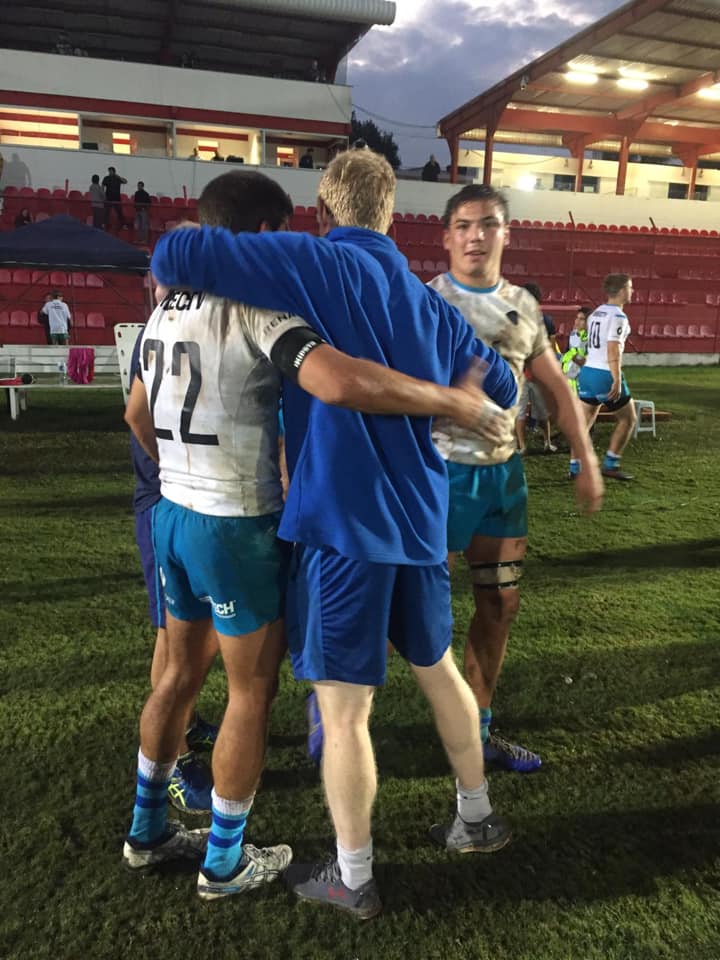
Dean with member of the Uruguayan Rugby team.
Montevideo for me was a very strange place initially, in one breath there were lots of nice cars and homes and some beautiful parts of the city. In another breath there was a lot of poverty and underdeveloped areas. I think my biggest challenge was living apart from Linsey, my fiancé. She came out and worked in the British School but we lived separately.
The other challenge, of course, was the language. Most people spoke English but not everyone. It’s incredible how you learn to communicate and it soon doesn’t become an obstacle. When you’re standing in front of the ladies 7’s trying to explain that tomorrow (manana) we will be doing XY and Z and you’re waffling about apples (manzanas) much to their bemusement. Mix-ups and a little humour go a long way in breaking down barriers.
What are your views on Uruguay rugby and the structures being put in place?
Initially, I knew very little about Uruguayan Rugby except that they competed in previous World Cups. I didn’t know much about the standard at all and having seen them beaten by an Ulster Academy select in Belfast, I was left wondering exactly where were these guys are at. When I went out there though it was a very different story. I echo what Mark Brady said in his previous interview. These guys may not be as physically imposing as some teams in world rugby but the heart, commitment, and attitude more than make up for that and they will never take a backward step. Something I said when I was given the chance to say my goodbyes to the squad as I had to leave a few days earlier than anticipated. My parting message was exactly that. Savour every moment of what is to be the most incredible experience of your life and never take a backward step.
Structurally there is a lot of work that needs to be done, but there is no doubt that they are moving in the right direction. To my knowledge a South American League, much like the MLR, is being developed which will expose the guys to more professional practices, Academy setups, hopefully following a well organised LTPD plan, and a much better standard of rugby on a regular basis. This will only lead to them going from strength to strength.
Throughout your time is Uruguay you’ve been introduced to different coaching styles and techniques, including those of Craig White. Can you describe your experience of working alongside Craig and what you have taken from his values as a coach?
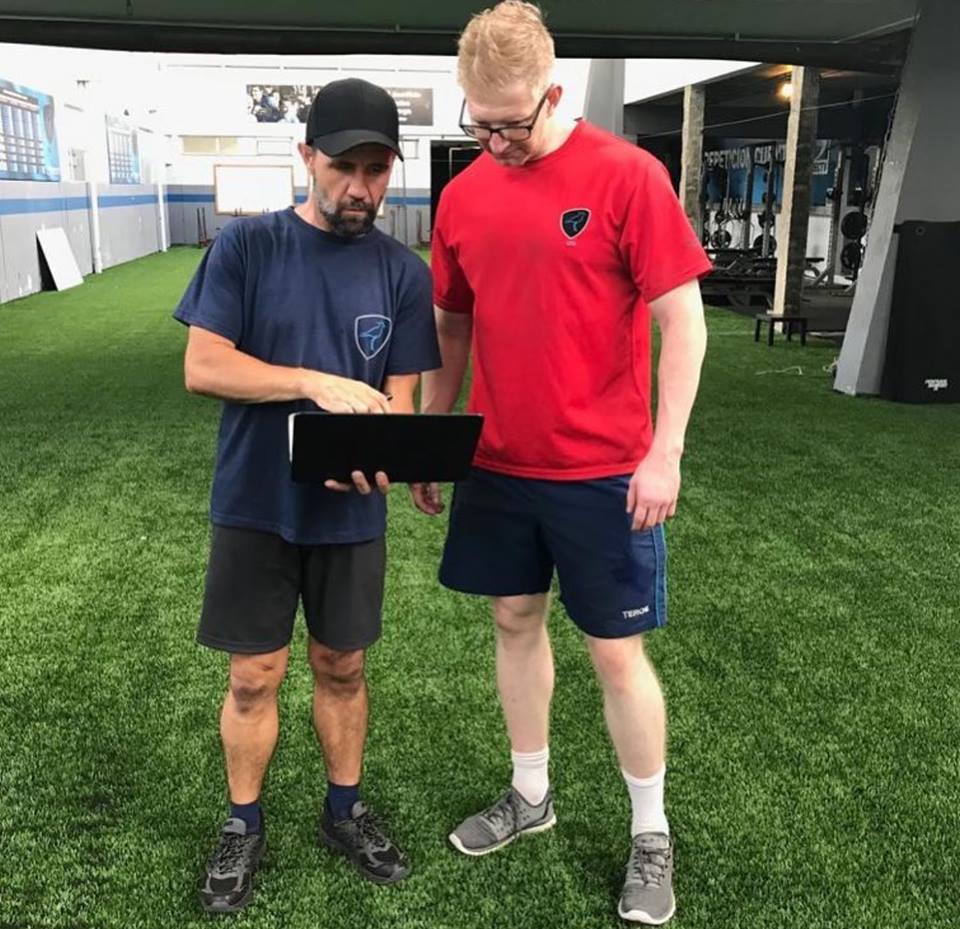
Dean and Craig White preparing for a pre-season training session.
Where do I start? Craig for me just brought this incredible experience of knowing what needed to be done. As I touched on earlier I felt he didn’t bring any rocket science to the program. To be honest, working with a man of his calibre that’s what I was expecting and thought that a lot of it would go over my head. That wasn’t the case. The detail was in the small things, like communication between departments, where players were at physically and mentally and what their little work-ons were to make them better players. The organisation from morning meetings, to monitoring, to GPS, to how field sessions should look where all intertwined to make a fully functional and effective program.
Craig’s biggest strength for me and something that will stay with me my whole career is his ability to read human behaviour. He was very big on holistic methods like breathing, visualisation, meditation and mindfulness. Something I completely bought into. My own personal interpretation of that is if you have decent well-balanced people around you the outcome is decent well-balanced athletes and coaches. Once you create a culture like that it develops an incredible atmosphere to get up to every morning. There’s no doubt we were and always will be a massive family. That was largely down to Craig’s leadership skills.
You’ve had an interesting journey to choose coaching as your career, who has influenced you? Who were your mentors?
There are many sides to this answer. I had a coach at school that I trained and played hard for in 3 years on the school 1st XV. I looked up to him, couldn’t wait all the way through school to get a chance to play for him. When I got my final year results, they weren’t great. I had to go in and it was him that gave them to me. He threw the envelope at me, shook his head and reduced me to tears. Now, in a roundabout way, that has shaped my coaching philosophy. Through my own experiences of going off the rails and performing poorly in school, hopefully, I can provide other support to young athletes if they need it. Really, he did me a favour.
Also, I joined Grant Davison probably about 4 years ago now over at Zeus Training, the little independent gym I talked about. The draw was his incredible work ethic and everything he has done was to provide for his family and to give them all they want in life. I wanted my values to line-up with his.
It goes without saying that Craig has had a huge impact on me, not only as a coach but as a person. Working with Ben Pollard who has 10 years of industry experience showed me the way in efficiency and accuracy in the job.
I also want to mention all the other coaches that I’ve been lucky enough to connect with on this incredible journey so far with a lot being Irish and have connections to the college. Dr Liam goes without saying, Gordon Brett, Mark Bennett, Nick Lumley, Jim Molony, Jason McGahan, Mark Brady, Ged Mcnamara, and Peter Tierney. They have all helped me along the way and I hope I can emulate their success. The incredible support from the lecturers and staff at the college is a massive contribution as to the direction my career is going.
Dr. Liam Hennessy often talks about blending the art and science of coaching. In your role as a coach, but also as a data scientist, how you do you mix the practical work with sports science data to better inform your players and fellow coaches? Particularly with the GPS work you were tasked with.
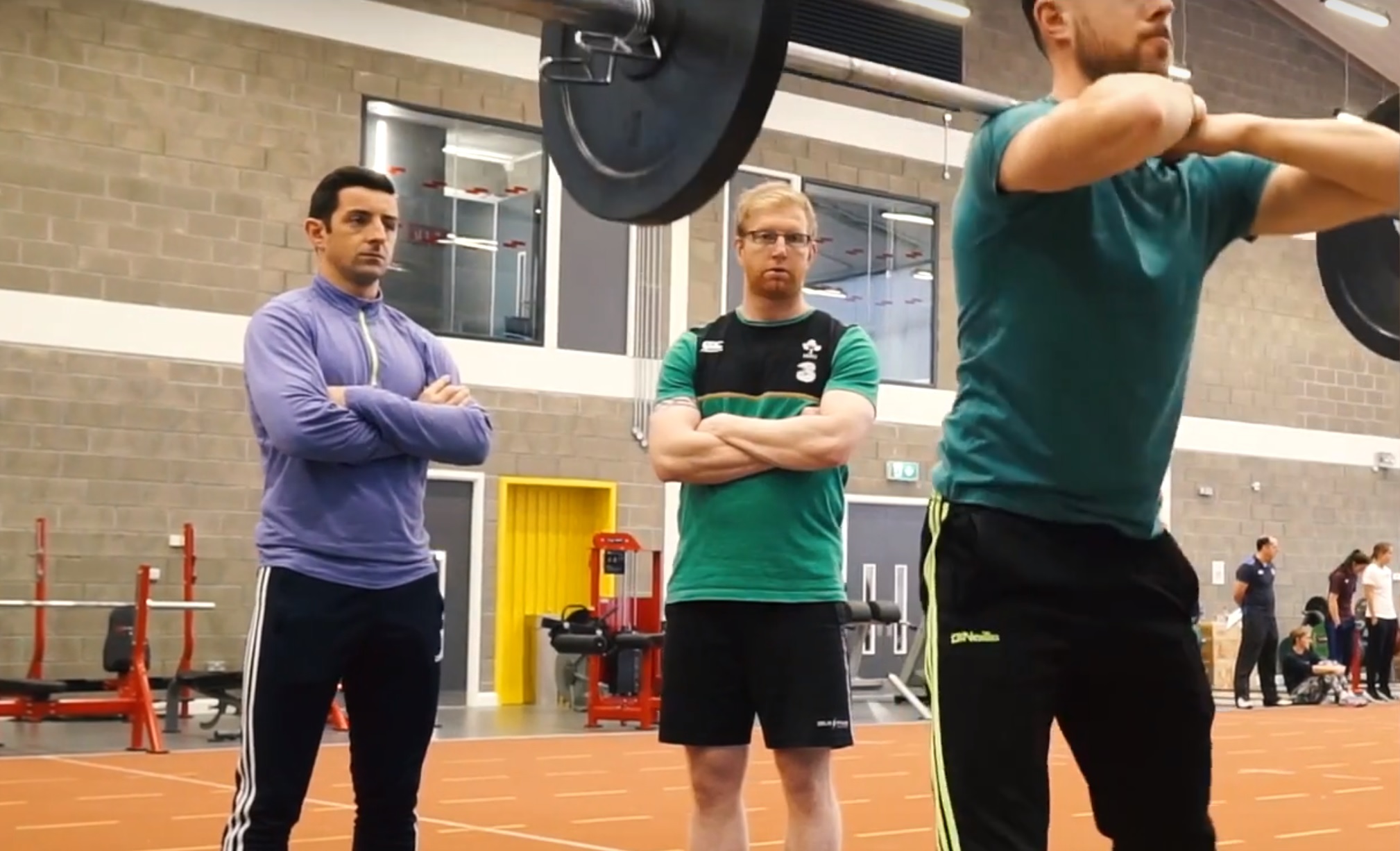
Dean taking part in a Setanta College workshop as part of his BSc in S&C.
As you well know, I only had a small amount of exposure to the GPS before I went. I did have a little input from other coaches at the start to try to help me understand what I was looking at. Some of the guys I mentioned above. Largely, I had to get my head around it myself. Craig was always challenging me to learn and ask the right questions. So I suppose my first hurdle was collecting the data while keeping it simple. From there I built a database and experimented looking at different metrics. Initially, I was looking at total metres and high speed running metres. I presented to the coaches after the first two competitions to outline my overall objectives, where I was with it and where I wanted to be.
The first thing I discovered was that our ‘red sessions’ or ‘high days’ were not replicating match demands and our ‘low days’ were too high intensity with very high accelerations. From here I was able to shape our training intensities on high and low days. I presented to the players, explained what a red session and green session should look like and immediately you could see the difference in the sessions. From that perspective, educating the players and the coaches is key and it’s also important to let them know the why. I guess that was my first real impact, I personally feel an important one from an injury prevention point of view. For me, it was about keeping it simple and initially presenting in simple terms for the players and coaches. When Ben arrived it put everything in place. He broke everything down and we worked off the ball in play data. We then tried to shape drills and conditioning sessions based off the back of that data as it was directly linked to match demands. We could see work to rest ratio, worst-case scenarios and max HR during those periods. We then reported this to the coaches and tried to design and replicate drills to meet those demands or above.
From your experience as a coach, and being at the forefront of witnessing a developing country compete for one of the world’s greatest sporting achievements, what are the trends in the sport or more importantly, what trends are worth paying attention to and implementing throughout training?
I’d have to say the game is so much more demanding physically. Players are bigger, stronger, faster and the impacts are like car crashes. As a coach of any description your number one priority has to be player welfare. You want your athlete to be in the best possible place to come out the other side fit and healthy, physically and mentally. With the evolution of technology, we can look in even more detail what the demands of a sport requires as a whole and positionally. For me, this is what should shape training and act as a basis for athlete preparation.
What makes an international rugby player in your opinion?
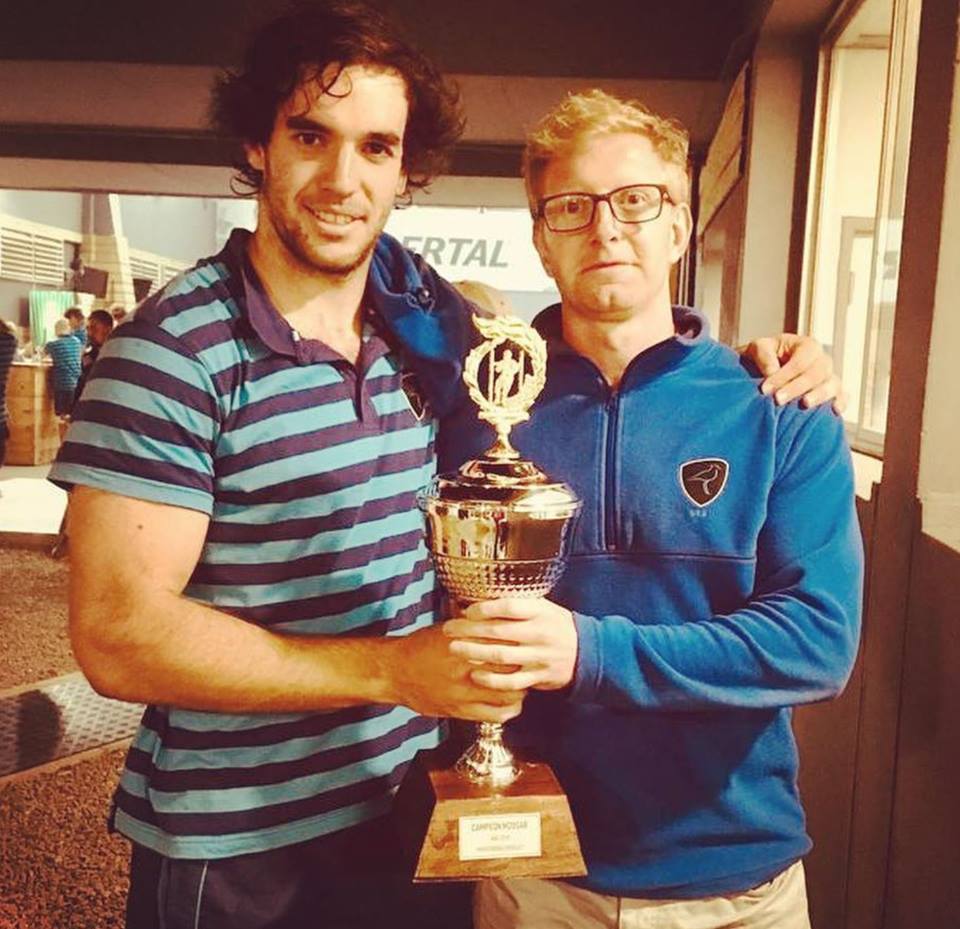
Dean was part of the victorious U-20 Uruguayan rugby backroom team and squad who won the South American championship, beating a much-fancied Argentina side 38-32 in the final.
I’m going to keep this one short. Incredible athletism, mental toughness, and integrity.
Uruguay are placed in Pool D against Australia, Wales, Georgia and Fiji, with fellow Setanta men Ged McNamara in Georgia. What are your thoughts ahead of Uruguay’s first match?
Our first game is against Fiji. We all know what they are capable of, they’re incredible athletes. Our boys are well-rehearsed and we know we have to work hard to close down their space. It’s a tough opener, the boys won’t take a backward step and they won’t lie down. It’s a tough group, they’ll step it up another notch and I know we’ll surprise a few people.
Who are the team to watch and what player do you think we will be all talking about?
I think South Africa will be very dangerous, Australia could also be tricky. For me, England are physical specimens right now. Let’s be honest, can we look past the All Blacks? James O’Connor has been away from international rugby for a while and his press hasn’t always been positive, so I’m really glad to see him back and I hope he displays the great player he is. All joking aside though, Ireland to pip Uruguay by 2 in the final and Rory Best top try-scorer?? No?
Following on from RWC2019. What are your goals?
My focus really is the last few modules of my BSc and heading into my Masters. I will be actively looking to continue on from this experience and hopefully pick up a paid role. My own goals are definitely to follow in the footsteps of all the guys I’ve mentioned so far. Maybe someday some young cub will be mentioning me as an influence or mentor.
It’s been great to talk to you Dean and see the success you have had. Have you any advice for an aspiring S&C coach who can learn from your journey?
It’s my pleasure, I couldn’t have done it without the support of the college, my fiancé and my family. It’s only the beginning.
It’s never too late. If an opportunity comes your way take it. Have an incredible hunger to learn, don’t be afraid to make mistakes or ask questions. The same as Dr Liam and Ged said, ‘Good people make good coaches’. It’s amazing what can come your way by just trying to be a little bit better every day.
It is only the beginning for Dean. Looking on from Setanta HQ it has been great to see Dean turn his knowledge into real tangible results with the squad that he now calls his brothers. A perfect example of a young coach studying, learning, working hard, getting experience, and showing absolute dedication to the craft of coaching. Vamos Los Teros!
Find more information on the courses available at Setanta College here, or contact a member of our team below.

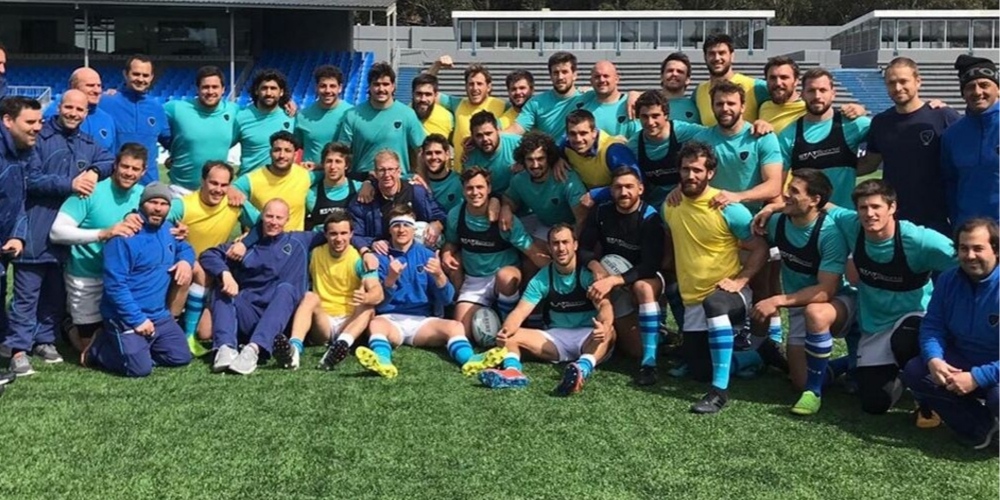
Leave A Comment